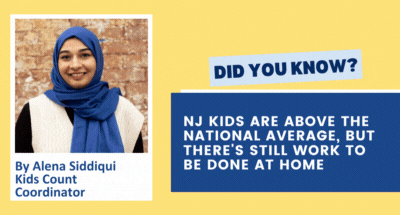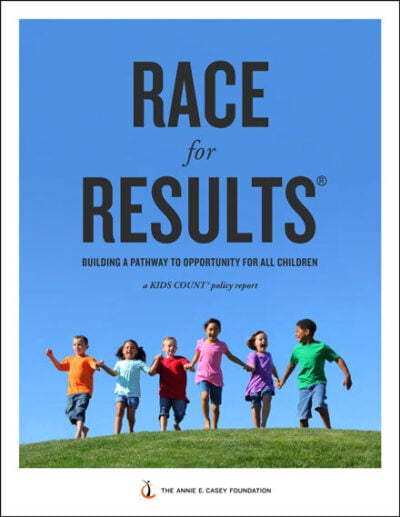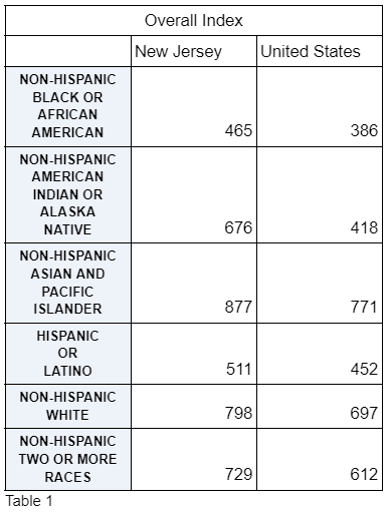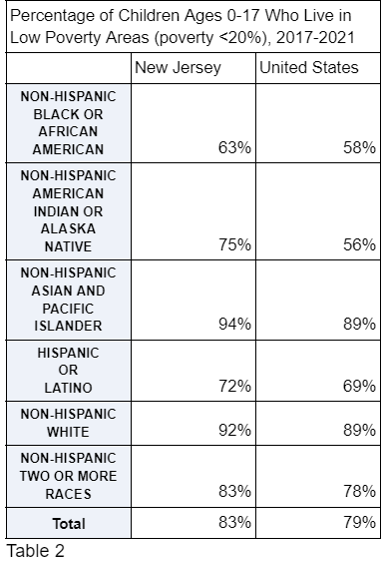New Jersey Ranks High in Child Well-Being, but Across the Country, Children of Color Face Disparate Outcomes, Jeopardizing Their Well-Being and America’s Future
2024 Race for Results Report Identifies Gaps in Child Well-Being That Persist Across Race and Ethnicity, Caused by Policy Choices That Shortchange Young People
NEWARK, NJ — New Jersey outpaces national statistics when it comes to enrollment in early education, high school graduation rates and the percentage of young adults completing an associate degree or higher. However, those results are in the context of a nationwide failure to equip all children to succeed, with policy choices and lack of support for families resulting in particularly dire outcomes for Black, Latino and American Indian or Alaskan Native.
Read Report: 2024 RACE FOR RESULTS: BUILDING A PATHWAY TO OPPORTUNITY FOR ALL CHILDREN
Key Findings:
- While 71% of New Jersey’s children were living at or above 200% of the poverty level (approximately $55,000 for a family of 4) according 2017-2021 data, when broken down by race/ethnicity, only 53% of both non-Hispanic Black or African American children and Hispanic or Latino children were living at or above 200% of the poverty level compared to 87% of non-Hispanic Asian Pacific Islander children and 82% of non-Hispanic White children.
- In 2022, 38% of New Jersey’s 4th graders scored at or above proficiency in reading. When broken down by race/ethnicity, it is apparent that there are wide disparities as 68% of 4th graders who identify as non-Hispanic Asian and Pacific Islander scored at or above proficient in reading, amongst the highest in the nation, while only 19% of non-Hispanic Black or African American 4th graders are proficient.
- During 2017-2021 in New Jersey, 69% of children ages 0-17 were reported to be living in 2-parent U.S born families while 82% of children were living in 2-parent immigrant families. This trend remains true for each race/ethnicity group as well. For example, 31% of black children lived in U.S born 2-parents families compared to 69% of black children who lived in 2-parent immigrant families.
“While New Jersey ranks well compared to other states for children living at or above the poverty level, even when broken down by race and ethnicity, it is important for us to compare how New Jersey’s children are doing in relationship with each other. ” said Mary Coogan, president and CEO of Advocates for Children of New Jersey, the state’s member of the KIDS COUNT network. “Key legislation like the state’s expanded child tax credit has helped thousands of families, but we must do more to ensure that children from all corners of the state have the opportunity to thrive.”
The Race for Results index standardizes scores across 12 indicators representing well-being milestones from cradle to career, converting them into a scale ranging from 0 to 1,000 to make it easy to compare and see differences across states and racial and ethnic groups. Indicators are grouped into four areas: early childhood, education and early work experiences, family resources and neighborhood context. Overall child well-being in New Jersey, when broken down by race/ethnicity, ranged from 465 for Black children, to 877 for Asian and Pacific Islander children.
Nationally, Asian and Pacific Islander children have the highest index score at 771, followed by white children at 697 and children of two or more races at 612. Scores for Latino (452), American Indian or Alaska Native (418) and Black children (386) are considerably lower. Calculations of the index for all 50 states show that experiences vary widely depending on where a child lives, from a high of 877 for Asian and Pacific Islander children in New Jersey to a low of 180 for American Indian or Alaska Native children in South Dakota.
Young people are missing critical developmental milestones as a direct result of choices to fail to invest in policies, programs and services that support children, especially in under-resourced communities and communities of color.
The Casey Foundation introduced the Race for Results index in a 2014 report and updated it in 2017. This third edition of the report carries data from the aftermath of the COVID-19 pandemic that demonstrates both the urgency of ensuring all children can thrive, and the promise of policy prescriptions for achieving that goal. Race for Results contends that young people are missing critical developmental milestones as a direct result of choices to not invest in policies, programs and services that support children, especially in under-resourced communities and communities of color.
The Casey Foundation makes several recommendations in Race for Results toward improving outcomes for all children:
- Congress should expand the federal child tax credit. The temporary, pandemic-era expansion of the CTC lifted 2.1 million children out of poverty, with the share of kids in poverty falling to 5.2% in 2021, the lowest rate on record.
- States and Congress should expand the earned income tax credit.
- Lawmakers should consider baby bonds and children’s savings accounts — programs that contribute public funds to dedicated accounts to help families save for their children’s future.
- Policymakers must create targeted programs and policies that can close well-being gaps for young people of color because universal policies are important, but insufficient, for continued progress.
The 2024 Race for Results report is available at http://www.aecf.org.









